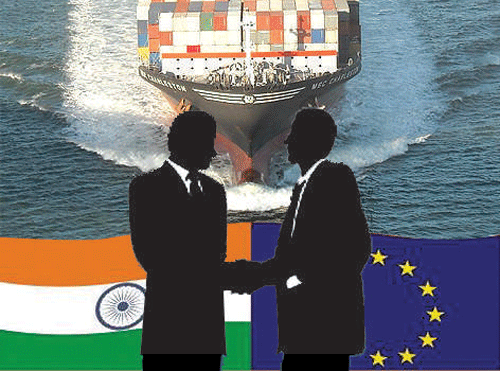
The impending EU-India Free Trade Agreement (FTA) is regarded in some quarters as constituting a massive corporate heist. Such a view is fuelled by the lack of transparency and the secretive nature of the negotiations. This is unacceptable given that the outcome of the negotiations could fundamentally restructure Indian society and impact the lives of hundreds of millions of Indians.
Negotiations cover a wide range of areas, including medicines, agriculture, various products and services, as well as investment rules, government procurement and intellectual property rights. However, due to the closed nature of the talks, people and groups in both Europe and India are rightly concerned that proper accountability and effective public scrutiny are being sidelined in favour of a business-led agenda. Their demands for transparency were however dealt a blow by a recent ruling.
It was discovered a while back that the European Commission (EC) had withheld information about the EU-India talks from the public, even though it had already shared the information with corporate lobby groups. The information in question concerns documents include meeting reports, emails and a letter, all of which the EC had sent to large corporate lobby groups. Lobby watchdog Corporate Europe Observatory (CEO) had argued that information could not suddenly become confidential, which it did, when a public interest group asked for it.
Although the EU’s General Court in Luxembourg recently concluded that the EC did not violate EU rules by doing this, CEO has now appealed to the European Court of Justice on the ruling.
CEO trade campaigner Pia Eberhardt says that the real issue at stake is whether the European Commission can continue negotiating backroom trade deals, together with, and for, a tiny elite of corporate lobby groups. At a time when more and more people fear that trade agreements threaten their basic rights to safe food, affordable medicines, a healthy environment and decent work, Eberhardt argues that we cannot sit by and fail to challenge a ruling that risks legitimising the privileged access that the EC grants big business over its policies.
Internal rules
In its appeal, CEO argues that the EU’s General Court made errors in law, including in assessing the role of the Commission’s internal rules on access to documents. The appeal comes as the EU and India are reportedly trying to sign the proposed trade agreement before elections in both regions in 2014. Trade unions, farmers, patients' organisations and other public interest groups have repeatedly sounded the alarm at the potentially devastating impacts of the deal, particularly on access to medicines, investment and procurement decisions and the livelihoods of Indian farmers and street traders. The deal could have detrimental implications for hundreds of millions of people in India.
The EU and the US are also currently engaged in their first round of negotiations in Washington for a major trade deal between the two blocks, which also bears the same hallmark of secrecy and a similar template for potential corporate plunder, not least, in terms of the entry of GM foods across Europe.
The EU-India FTA essentially represents the demands of big business in the West and results from their strategic hegemony over government bureaucracies and politicians. With Western economies in crisis, India represents potential rich pickings for transnational corporations.
Pia Eberhardt states that for too long, the EC has negotiated trade agreements in secret and catered for the needs of transnational companies. CEO is challenging this complicity, trying to redress the balance in favour of transparency and a trade policy in the interest of the many rather than the few.
CEO’s appeal will now be reviewed by the European Court of Justice. The EC and Germany, which intervened in the case, will then respond in writing. Once the written procedure is declared closed, the European Court of Justice will either set a date for an oral hearing or forego a hearing and issue a ruling.
The EU-India (and EU-US) free trade talks raise two key questions. Is it right that far reaching free trade treaties are negotiated in secret, while the public is excluded and kept n the dark? Is it right that big corporations are given privileged access to negotiations?
Given the corporate-led agenda that is driving the negotiations, it is little wonder that the EC does not want ordinary Europeans to know about the negotiations. The same could be said as far as ordinary Indians are concerned as well.
Farmers and trade unions in India, via the alliance of the Anti FTA front, have written 872 letters to important officials, organisations and political parties about the FTA. Rakesh Tikait of the Bhartiya Kisan Union argues that, although there are serious impacts on food security and the livelihood security of millions of farmers and small retailers, farmers haven't even been informed nor consulted about the FTA.
Praveen Khandelwal, Secretary General of Confederation of All India Traders (CAIT) states that India should not legally commit to policies under this FTA. He believes that the government cannot seal this issue at the behest of EU while a national debate is still ongoing on the subject.
Perhaps that is the whole point behind the secrecy, though - to prevent or limit any such debate, whether in Europe or in India. It all begs the question: are we to witness democracy in both Europe and India being sidelined in the blind pursuit of a corporate driven agenda?